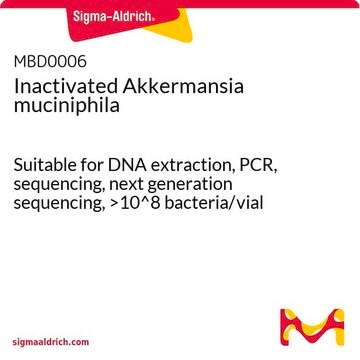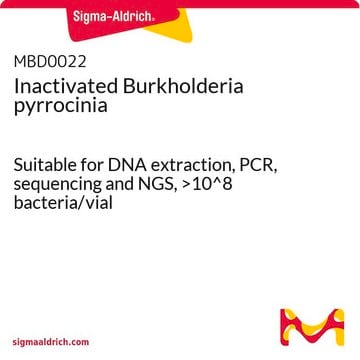MBD0001
Microbial DNA standard from Akkermansia muciniphila
Suitable for PCR, sequencing and NGS, 10 ng/μL
Přihlásitk zobrazení cen stanovených pro organizaci a smluvních cen
About This Item
UNSPSC Code:
41105500
NACRES:
NA.24
Doporučené produkty
Quality Level
form
liquid
concentration
10 ng/μL
technique(s)
DNA extraction: suitable
DNA sequencing: suitable
PCR: suitable
shipped in
ambient
storage temp.
−20°C
Související kategorie
General description
Standardization of sample analysis is currently needed in microbiome genomics research workflow. Lack of standardization can lead to biases and errors in common processes during sample preparation and analysis such as sample amplification, sequencing and bioinformatics analyses.1 Akkermansia muciniphila genomic DNA microbial standard can serve as standard for benchmarking the performance along the workflow of microbiomics or meta-genomics analyses and as a tool to increase reproducibility and allow comparison of results obtained by different labs.
Akkermansia muciniphila is a gram negative, anaerobic, non motile, non spore forming and oval shaped bacterium. A. muciniphila inhabits the gastrointestinal tracts of more than 90% of adults and constitutes 1 to 4% of the fecal microbiota.2 A. muciniphila level was suggested to be a biomarker for a healthy intestin. 3
A. muciniphila degrades mucus and utilizes it as a carbon/nitrogen source. Consequently, the host produces additional mucus while the bacterium produces oligosaccharides and Short Chain Fatty Acids (SCFAs) that can be utilized by the host and trigger the immune system. An additional protective effect of the SCFA is stimulation of mucus-associated microbiota growth, that serves as a barrier against penetration of pathogens to intestinal cells. 2,4
Read here how to use our standards to ensure data integrity for your microbiome research.
Akkermansia muciniphila is a gram negative, anaerobic, non motile, non spore forming and oval shaped bacterium. A. muciniphila inhabits the gastrointestinal tracts of more than 90% of adults and constitutes 1 to 4% of the fecal microbiota.2 A. muciniphila level was suggested to be a biomarker for a healthy intestin. 3
A. muciniphila degrades mucus and utilizes it as a carbon/nitrogen source. Consequently, the host produces additional mucus while the bacterium produces oligosaccharides and Short Chain Fatty Acids (SCFAs) that can be utilized by the host and trigger the immune system. An additional protective effect of the SCFA is stimulation of mucus-associated microbiota growth, that serves as a barrier against penetration of pathogens to intestinal cells. 2,4
Read here how to use our standards to ensure data integrity for your microbiome research.
Application
Suitable for Quantitative standard for PCR, Sequencing and NGS
Features and Benefits
- Individual microbial standard for microbiomics and meta-genomics workflow
- Suitable standard for PCR, sequencing and NGS
- Improve Bioinformatics analyses
- Increases reproducibility
- Compare results lab to lab
Physical form
Liquid - The genomic DNA is provided at ≥10 ng/μL concentration in TE buffer pH 8.0
Other Notes
It is recommended to avoid freeze thaw cycles of this product.
Storage Class
12 - Non Combustible Liquids
wgk_germany
WGK 1
flash_point_f
Not applicable
flash_point_c
Not applicable
Osvědčení o analýze (COA)
Vyhledejte osvědčení Osvědčení o analýze (COA) zadáním čísla šarže/dávky těchto produktů. Čísla šarže a dávky lze nalézt na štítku produktu za slovy „Lot“ nebo „Batch“.
Již tento produkt vlastníte?
Dokumenty související s produkty, které jste v minulosti zakoupili, byly za účelem usnadnění shromážděny ve vaší Knihovně dokumentů.
Clara Belzer et al.
The ISME journal, 6(8), 1449-1458 (2012-03-23)
The human intestinal tract is colonized by a myriad of microbes that have developed intimate interactions with the host. In healthy individuals, this complex ecosystem remains stable and resilient to stressors. There is significant attention on the understanding of the
Muriel Derrien et al.
International journal of systematic and evolutionary microbiology, 54(Pt 5), 1469-1476 (2004-09-25)
The diversity of mucin-degrading bacteria in the human intestine was investigated by combining culture and 16S rRNA-dependent approaches. A dominant bacterium, strain MucT, was isolated by dilution to extinction of faeces in anaerobic medium containing gastric mucin as the sole
Chin Wen Png et al.
The American journal of gastroenterology, 105(11), 2420-2428 (2010-07-22)
Mucosa-associated bacteria are increased in inflammatory bowel disease (IBD), which suggests the possibility of an increased source of digestible endogenous mucus substrate. We hypothesized that mucolytic bacteria are increased in IBD, providing increased substrate to sustain nonmucolytic mucosa-associated bacteria. Mucolytic
J Paul Brooks et al.
BMC microbiology, 15, 66-66 (2015-04-17)
Characterizing microbial communities via next-generation sequencing is subject to a number of pitfalls involving sample processing. The observed community composition can be a severe distortion of the quantities of bacteria actually present in the microbiome, hampering analysis and threatening the
Sortimentní položky
DNA standards enhance metagenomics research integrity, offering precise species study and mixed community standards.
Náš tým vědeckých pracovníků má zkušenosti ve všech oblastech výzkumu, včetně přírodních věd, materiálových věd, chemické syntézy, chromatografie, analytiky a mnoha dalších..
Obraťte se na technický servis.








